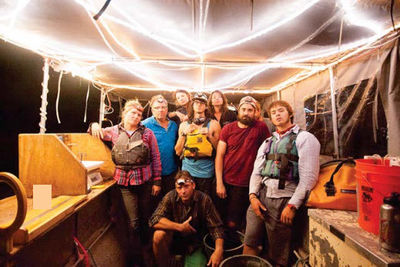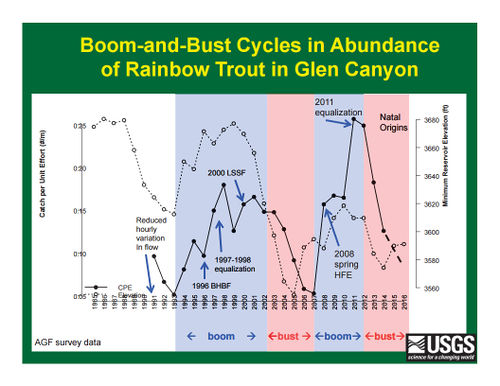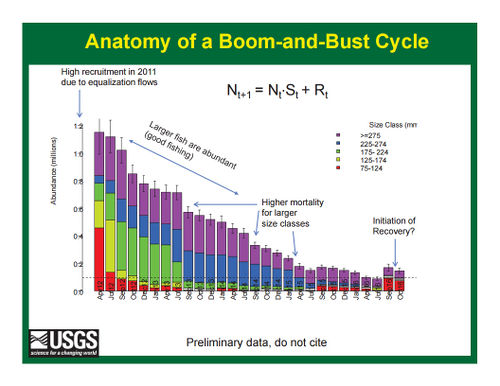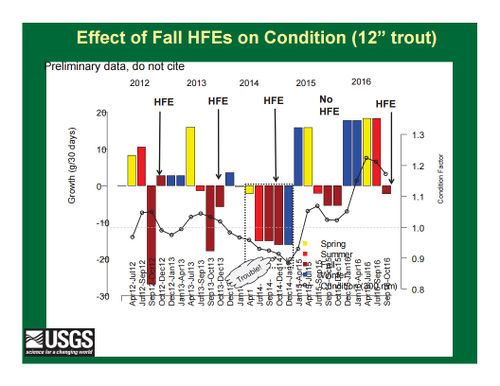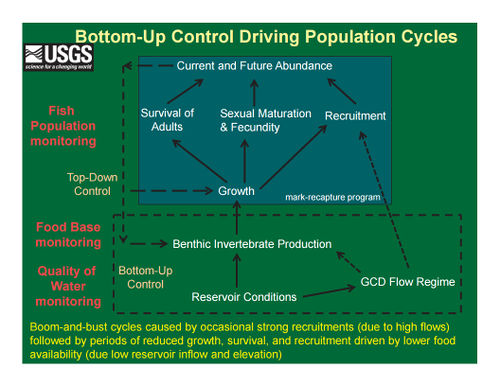Difference between revisions of "Bioenergetics Studies"
From Glen Canyon Dam AMP
Cellsworth (Talk | contribs) (Created page with " __NOTOC__ __NOEDITSECTION__ <!-- ------------------------------Banner across top of page------------------------------> {| style="width:100%; background:#fcfcfc; margin-to...") |
Cellsworth (Talk | contribs) |
||
| (6 intermediate revisions by the same user not shown) | |||
| Line 17: | Line 17: | ||
</table> | </table> | ||
| + | [[Image:NOcrew.jpg|center|400px]] | ||
<!-- | <!-- | ||
| Line 23: | Line 24: | ||
|style="width:60%; font-size:120%;"| | |style="width:60%; font-size:120%;"| | ||
| + | ===The interaction of fish, foodbase, and temperature=== | ||
| + | Fish occupying warmer water have higher metabolic demands than individuals in cooler water, and if these demands increase concurrently with a seasonal decline in prey availability, then growth rates may be reduced. [http://wec.ufl.edu/floridarivers/NSE/Finch%20RRA%20HBC%20Growth%20NSE.pdf] | ||
|}<!-- | |}<!-- | ||
| Line 37: | Line 40: | ||
{|width="100%" cellpadding="2" cellspacing="5" style="vertical-align:top; background:#f5faff;" | {|width="100%" cellpadding="2" cellspacing="5" style="vertical-align:top; background:#f5faff;" | ||
! <h2 style="margin:0; background:#cedff2; font-size:120%; font-weight:bold; border:1px solid #a3bfb1; text-align:left; color:#000; padding:0.2em 0.4em;">Updates</h2> | ! <h2 style="margin:0; background:#cedff2; font-size:120%; font-weight:bold; border:1px solid #a3bfb1; text-align:left; color:#000; padding:0.2em 0.4em;">Updates</h2> | ||
| − | |||
| + | [[Image:BoomBust.jpg|center|500px]] | ||
| + | [[Image:TroutDecline.jpg|center|500px]] | ||
| + | [[Image:HFEsTroutCondition.jpg|center|500px]] | ||
| + | [[Image:BottomUpContol.jpg|center|500px]] | ||
| + | |||
| + | |||
| + | |} | ||
<!-- | <!-- | ||
| Line 50: | Line 59: | ||
|style="color:#000;"| | |style="color:#000;"| | ||
| + | *[http://gcdamp.com/index.php?title=FISHERY Rainbow Trout Page] | ||
| + | *[http://gcdamp.com/index.php?title=Humpback_Chub_Page Humpback Chub Page] | ||
| + | *[http://gcdamp.com/index.php?title=FOOD_BASE Aquatic Foodbase Page] | ||
| + | *[http://gcdamp.com/index.php?title=Nutrients Nutrients Page] | ||
|- | |- | ||
| Line 56: | Line 69: | ||
|style="color:#000;"| | |style="color:#000;"| | ||
| + | *[http://gcdamp.com/index.php?title=Natal_Origins_Project_(NO) Natal Origins Project (NO)] | ||
|- | |- | ||
| Line 61: | Line 75: | ||
|- | |- | ||
|style="color:#000;"| | |style="color:#000;"| | ||
| + | |||
| + | '''2020''' | ||
| + | *[https://esajournals.onlinelibrary.wiley.com/doi/10.1002/bes2.1810 Korman et al., 2021, Controls on somatic growth and population dynamics of rainbow trout: Bulletin of the Ecological Society of America] | ||
| + | *[https://doi.org/10.1002/ecm.1427 Korman et al., 2020, Changes in prey, turbidity, and competition reduce somatic growth and cause the collapse of a fish population: Ecological Monographs ] | ||
| + | *[https://www.usbr.gov/uc/progact/amp/twg/2020-01-13-twg-meeting/20200113-AnnualReportingMeeting-PredictionsPopulationsEnergeticConstraints-Presentation-508-UCRO.pdf Predictions, populations, and energetic constraints ] | ||
'''2017''' | '''2017''' | ||
| Line 80: | Line 99: | ||
'''2011''' | '''2011''' | ||
*[http://www.tandfonline.com/doi/abs/10.1577/T04-090.1?src=recsys&journalCode=utaf20 Petersen and Paukert. 2011. Development of a Bioenergetics Model for Humpback Chub and Evaluation of Water Temperature Changes in the Grand Canyon, Colorado River. Transactions of the American Fisheries Society, Volume 134, 2005 - Issue 4.] | *[http://www.tandfonline.com/doi/abs/10.1577/T04-090.1?src=recsys&journalCode=utaf20 Petersen and Paukert. 2011. Development of a Bioenergetics Model for Humpback Chub and Evaluation of Water Temperature Changes in the Grand Canyon, Colorado River. Transactions of the American Fisheries Society, Volume 134, 2005 - Issue 4.] | ||
| + | |||
| + | |- | ||
| + | ! <h2 style="margin:0; background:#cedff2; font-size:120%; font-weight:bold; border:1px solid #a3b0bf; text-align:left; color:#000; padding:0.2em 0.4em;">Potential Policy Implications [https://www.usbr.gov/uc/rm/amp/twg/mtgs/17jan26/AR15_Korman.pdf]</h2> | ||
| + | |- | ||
| + | |style="color:#000;"| | ||
| + | |||
| + | Avoid boom-and-bust cycles to reduce trout export to LCR and maintain consistent catch rates and larger trout in the fishery: | ||
| + | *Enhance food supply via ‘bug flows’ or fertilization (add liquid nitrogen & phosphorous) as a mitigation for fluctuating flows and low reservoir elevation | ||
| + | *Limit recruitment via Trout Management Flows (TMFs) | ||
| + | *Do not implement fall HFEs in years when trout are in poor condition | ||
| + | *Fertilize prior to conducting an HFE to mitigate negative effects | ||
| + | |||
| + | Critical uncertainties: | ||
| + | *Will TMFs be implemented & work? What years to implement (e.g., 2016)? | ||
| + | *Will bug flows or fertilization increase food supply? | ||
| + | *Does enhanced food supply increase or decrease extent of trout export? | ||
| + | |||
| + | |- | ||
| + | ! <h2 style="margin:0; background:#cedff2; font-size:120%; font-weight:bold; border:1px solid #a3b0bf; text-align:left; color:#000; padding:0.2em 0.4em;">Monitoring Needs [https://www.usbr.gov/uc/rm/amp/twg/mtgs/17jan26/AR15_Korman.pdf]</h2> | ||
| + | |- | ||
| + | |style="color:#000;"| | ||
| + | |||
| + | STAY ON THE ROAD TO LEARNING: Estimate growth, survival, recruitment, and abundance by mark-recapture at time- scale that is fine enough to address GCD AMP questions. | ||
| + | *Response of recruitment to a particular flow in one year (e.g. spring HFE, 2011 equalization) | ||
| + | *Seasonal effects of fall HFEs on growth | ||
| + | *“Identify approaches to determine the root cause(s) of the unstable trout population in Lees Ferry” (#1 question) | ||
| + | *Measure export of trout from Glen Canyon to upper Marble Canyon (tagging not needed) | ||
| + | |||
| + | The current Catch-Per-Effort survey provides imprecise indices of recruitment and abundance. | ||
| + | *Useful for assessing trends in population over longer blocks of time (e.g. 5 yrs), but not for tracking annual changes needed to address management questions. | ||
| + | *Growth is not estimated from CPE surveys but is needed to understand why recruitment and abundance are changing, and effects of fall HFEs. | ||
| + | |||
| + | Two choices for TWG: | ||
| + | *Keep asking current management questions and therefore continue with mark-recapture program that can address these questions. | ||
| + | *Ask much simpler questions restricted to long-term trends in status which can be addressed from current CPE program. | ||
|- | |- | ||
Latest revision as of 15:27, 23 February 2021
|
|
The interaction of fish, foodbase, and temperatureFish occupying warmer water have higher metabolic demands than individuals in cooler water, and if these demands increase concurrently with a seasonal decline in prey availability, then growth rates may be reduced. [1] |
| -- |
-- |
-- |
|---|
|
|
